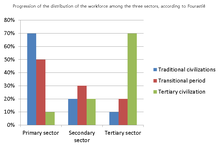| Economic sectors |
|---|
| Three-sector model |
|
| Additional sectors |
|
| Theorists |
| Sectors by ownership |



One classical breakdown of economic activity distinguishes three sectors:[1]
- Primary: involves the retrieval and production of raw-material commodities, such as corn, coal, wood or iron. Miners, farmers and fishermen are all workers in the primary sector.
- Secondary: involves the transformation of raw or intermediate materials into goods, as in steel into cars, or textiles into clothing. Builders and dressmakers work in the secondary sector.
- Tertiary: involves the supplying of services to consumers and businesses, such as babysitting, cinemas or banking. Shopkeepers and accountants work in the tertiary sector.
In the 20th century, economists began to suggest that traditional tertiary services could be further distinguished from "quaternary" and quinary service sectors. Economic activity in the hypothetical quaternary sector comprises information- and knowledge-based services, while quinary services include industries related to human services and hospitality.[2]
Economic theories divide economic sectors further into economic industries.
YouTube Encyclopedic
-
1/3Views:80 6974 012433 191
-
Economic Activities: Primary, Secondary, Tertiary, Quaternary, Quinary (AP Human Geography)
-
The Sectors of the Economy
-
SECTORS OF INDIAN ECONOMY (FULL CHAPTER) || CLASS 10 ECONOMICS
Transcription
Historic evolution
An economy may include several sectors that evolved in successive phases:
- The ancient economy built mainly on the basis of subsistence farming.
- The industrial revolution lessened the role of subsistence farming, converting land-use to more extensive and monocultural forms of agriculture over the last three centuries. Economic growth took place mostly in the mining, construction and manufacturing industries.
- In the economies of modern consumer societies, services, finance, and technology—the knowledge economy—play an increasingly significant role.
Even in modern times, developing countries tend to rely more on the first two sectors, in contrast to developed countries.
By ownership
An economy can also be divided along different lines:
- Public sector or state sector
- Private sector or privately run businesses
- Voluntary sector
See also
- Three-sector theory
- Jean Fourastié
- Industry classification
- International Standard Industrial Classification
- Industry Classification Benchmark
- North American Industry Classification System – a sample application of sector-oriented analysis
- Division of labour
- Economic development
References
- ^ Zoltan Kenessey. "The Primary, Secondary, Tertiary and Quaternary Sectors of the Economy" (PDF). The Review of Income and Wealth. Archived (PDF) from the original on 12 March 2019. Retrieved 20 April 2012.
Regarding the terminology itself Clark informs that "the term tertiary industries was originated by Professor A. G. B. Fisher in New Zealand, and became widely known through the publication of his book, The Clash of Progress and Security, in 1935. It took its origin from the titles current in Australia and New Zealand of 'primary industry' for agriculture, grazing, trapping, forestry, fishing and mining, and 'secondary industry' for manufacture. In Australia and New Zealand these terms are not only used in statistical reference books but are widely current in popular discussion. The phrase 'tertiary industries' therefore immediately carries, in these countries, a suggestion of those excluded by the official definition of 'secondary industries."
- ^ Matt Rosenberg (14 January 2007). "Sectors of the Economy". About.com. Archived from the original on 19 November 2016. Retrieved 20 April 2012.
